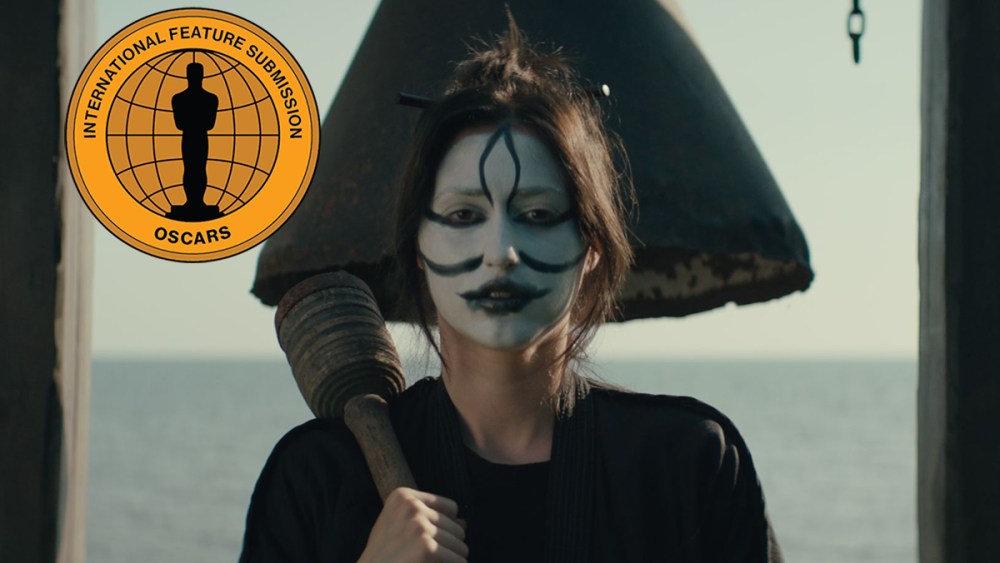White cherry blossoms descend from the sky just as a tragedy is about to change the course of a uniquely religious fishing community on the shores of Lake Peipsi, the body of water that separates Estonia from Russia. Relatively commonplace as that description may read, writer-director Marko Raat’s “8 Views of Lake Biwa” is closer to a dreamlike folktale — set sometime during the 20th century — than to pastoral realism.
For starters, Raat took the title, along with the names for each segment the narrative is divided into, from a series of centuries-old Japanese paintings (in turn inspired by ancient Chinese art) depicting scenic views from distinct points along the eponymous Lake Biwa, near the city of Kyoto. And while the geographic location in the film is nowhere near that Asian nation, in this imagined reality, Raat’s characters can seemingly travel to Japan by boat without much trouble, as if it were just a short trip across the lake.
As whispered prayers and poetic musings, the character’s inner monologues manifest in soft-spoken voiceover throughout this enigmatic romantic drama that was Estonia’s Oscar entry for best international feature film. As one tries to grasp the mythology of this place, which feels almost impenetrable and yet embedded into every aspect the plot, Raat’s ensemble piece overwhelms the mind, until its stark mysticism slowly begins unfurling.
Though not obvious at first, “8 Views” interlaces the stories of several people suffering because destiny (or the Christian God they so devotedly worship) took away the person they loved. To cope with the sorrow, they now try to force that feeling again with someone else, but the result is disappointing. One by one, the characters face devastating heartbreak.
Take for instance Õnne (Tiina Tauraite), the local teacher who begins a relationship with Andrei (Meelis Rämmeld ), a troubled fisherman with a corrosive secret, immediately after her husband Sora (Jan Uuspõld) died in a mysterious incident. Or, in one of the film’s most bizarre chapters, Roman (Hendrik Toompere Jr.), a widower and the town’s fishing inspector, who rents a blind woman known as Rabbit Eye (Maarja Jakobson) to be his wife for a few months after a godsend dream he had. Prior to this, she’d been kept in captivity her whole life and forced into sexual slavery. But no matter how puzzling the situation turns, Raat resolves them with a fascinating penchant for retribution, not unlike the punitive God in the Bible. No selfish deed goes unpunished in this lakeside refuge.
Breathtaking imagery provides a disorienting backdrop for the human drama. Early on, cinematographer Sten-Johan Lil captures ethereal wide shots of the lake, where the pale water and a sky covered in pillowed white clouds nearly blend into each other, only separated by a blurred horizon line, as if heaven and earth had at last become one. Wind turbines move in unison as the pinkish, dwindling light of dusk washes over them. There’s a heaven-like image of multiple girls walking on water amid cherry trees. These conjure an otherworldly allure that matches the overall melancholic tone that Raat imbues into every element.
For a while, “8 Views” functions partly as a coming-of-age vehicle for Hanake (Elina Masing), Roman’s peculiar teenage daughter and her best friend Seashell (Kärt Kokkota). The pair have promised one another to never grow up. The adult world, they infer, brims with many burdens of the soul. But Hanake’s sexual awakening threatens that pact. When a yacht docks in town, she immediately surrenders to her burgeoning desire for an older man. On the walls of Hanake’s bedroom, religious symbols mix with drawings of fetish binding, signaling the duality that governs her young mind. In a layered performance, Masing’s mischievous demeanor in the early chapters vanishes as the character gets older and is replaced with the grown-up disillusionment that Haneke feared.
Despite their evident links, the segments play out as if they were independently conceived vignettes that share thematic shades and the same atmosphere. Out of the verbose dialogue and voiceover, some of the adages that the characters express land with vivid lyricism: “May you have the endless clam of a wave rolling towards the ocean,” says a young man desperately in love with Seashell. “I don’t want to smile and hug unwillingly anymore,” Hanake utters upon her return from working as a dancer in Tokyo. That fictional proximity of Japan also visibly influences the production design of her and Roman’s home.
No one would deem Raat’s “8 Views” easily accessible, but that doesn’t mean it’s in any way indecipherable, obtuse nor unsatisfying. And that’s confirmed by the final chapter, which sucks the air out of the fairytale and absolves God of the misery that befalls these characters. A decade into the future, Õnne gets all the answers she had long for. This concluding tell-all cements Tauraite’s mournful turn as a standout in a full-bodied cast. Raat’s most terrifying revelation is that the magical occurrences they read as divine signs might have far more terrestrial explanations. Is there anything more devastating than accepting one is at least partially responsible for what we attribute to fate?

